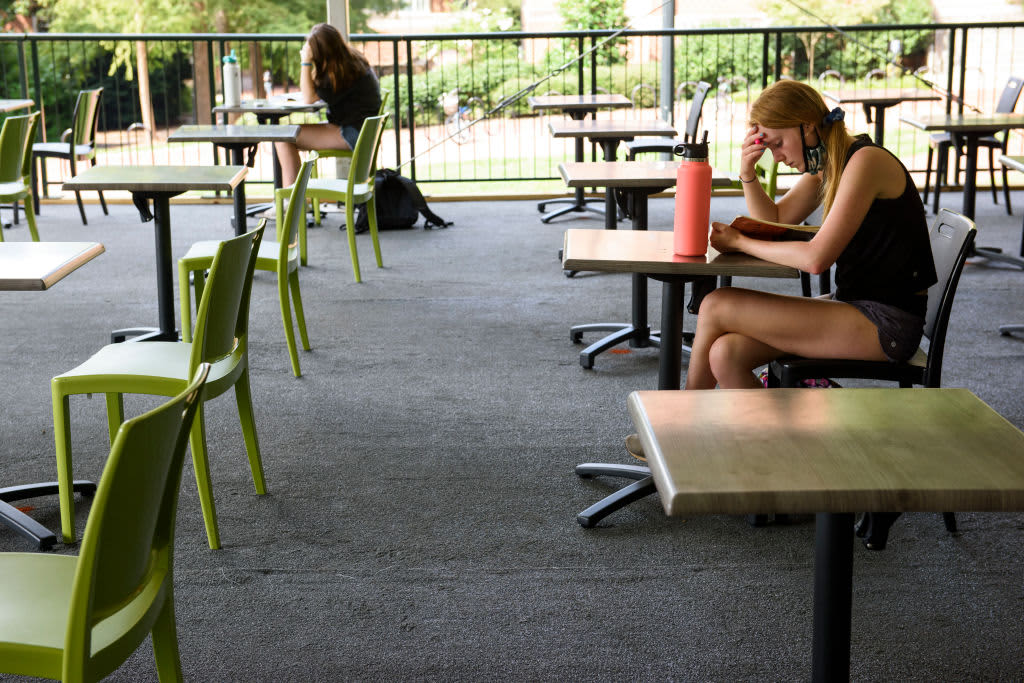With the fall semester just underway, and cases of coronavirus rising at colleges across the country, one school after another is pivoting to distance learning.
That doesn’t sit well with students who signed up for — and paid for — on-campus instruction.
Although Virginia Commonwealth University adopted a hybrid approach with a combination of in-person and online classes, Anthony Belotti, 20, says every one of his classes is now online.
“I feel like I’m teaching myself the material and every day is a new frustration,” said the junior from Fredericksburg, Virginia.
Plus, “I’m not getting the networking or one-on-one interactions with the professors,” he added.
Anthony Belotti, right, is a junior at Virginia Commonwealth University.
Source: Anthony Belotti
Many students and their parents argue that online is just not the same as face-to-face — and the tuition tab should reflect that.
“Students are justifiably angry and they are suffering financially, logistically, mentally and emotionally from these major, last-minute changes to their college plans,” said James Toscano, president of Partners for College Affordability and Public Trust.
“Some schools are finding creative and incremental ways to do the right thing by their students, so clearly, it is possible to do so.”
A few colleges are, in fact, discounting tuition for the fall semester.
Others, however, are increasing the cost, either by charging higher tuition or tacking on fees.
More from Personal Finance:
Colleges pass Covid-related expenses on to students
Here’s how to get a college tuition refund
Will pandemic force your college to go bankrupt?
Although Virginia Commonwealth held tuition steady, the school raised fees nearly across the board, including increases to the university fee, technology fee and library fee.
“I’m paying more [this year] because of a fee increase. They [the school] didn’t specify what it was for,” Belotti said.
For Belotti, every bit counts.
The political science major is able to afford college with a combination of student loans and a full-time job off campus.
Amid campus shutdowns due to Covid-19, a growing number of college students are now taking their cases to court seeking repayment for tuition, fees and room and board.
A University of Washington graduate student is among the latest to file a class-action lawsuit against his school.
“Despite sending students home, transitioning to online instruction, and closing its campuses, University of Washington continued to charge for tuition and/or fees as if nothing changed, continuing to reap the financial benefit of millions of dollars from students,” according to the complaint.
“It is our hope that through this litigation, UW can come to recognize its responsibility to tuition-payers and the ways in which it has failed to deliver what it promised them,” said Steve Berman, managing partner of Hagens Berman and attorney for students in the class action.
“We understand and share the frustration and disappointment that students and their families are experiencing as we navigate the unprecedented limitations presented by the Covid-19 pandemic,” said Victor Balta, a spokesperson for the university.
We understand and share the frustration and disappointment that students and their families are experiencing.
Victor Balta
University of Washington spokesperson
“The move to online instruction has actually increased our investment in instructional costs,” Balta said. “We continue to pay faculty and staff for their work, and at the same time are making existing and new services available online and investing in new technological capabilities as we serve students remotely and support the UW community in these extraordinary times.”
There is little hope of recouping these costs when schools revert to remote learning, according to Hafeez Lakhani, founder and president of Lakhani Coaching.
Declining enrollment, refund requests and increased costs due to technology upgrades and new public safety measures are putting many schools in extreme financial jeopardy, he said.
Hagens Berman has filed similar actions against Boston University, Brandeis University, Brown University, Emory University, George Washington University, Harvard University, Hofstra University, University of Miami, New York University, Pepperdine University, Quinnipiac University, Rutgers University, University of Southern California, Vanderbilt University and Washington University in St. Louis.
